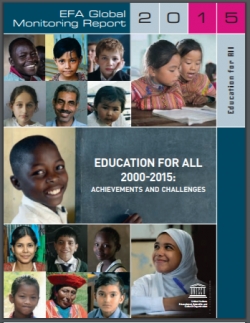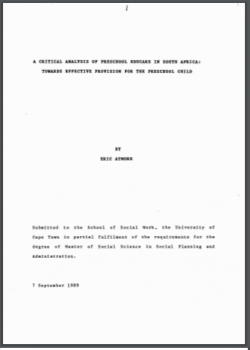EFA global monitoring report Education for all 2000-2015 : achievements and challenges

Buy online ($)
Type
E-Book
Authors
ISBN 13
9789231000850
Category
ECCE, Foundation, Intermediate, Senior
[ Browse Items ]
Publication Year
2015
Publisher
UNESCO, Paris, France
URL
[ private ]
Pages
516 p.
Subject
Early childhood education, Primary education, Intermediate Phase, Senior Phase, Literacy, Educational standards, Participation in education
Tags
Series Name
Abstract
‘There are still 58 million children out of school globally and around 100 million children who do not complete primary education. Inequality in education has increased, with the poorest and most disadvantaged shouldering the heaviest burden. The world’s poorest children are four times more likely not to go to school than the world’s richest children, and five times more likely not to complete primary school. Conflict remains a steep barrier, with a high and growing proportion of out-of-school children living in conflict zones. Overall, the poor quality of learning at primary level still has millions of children leaving school without basic skills. What is more, education remains under-financed. Many governments have increased spending, but few have prioritized education in national budgets, and most fall short of allocating the recommended 20% needed to bridge funding gaps. The picture is similar with donors, who, after an initial boost in aid budgets, have reduced aid to education since 2010 and not sufficiently prioritized those countries most in need. This Report draws on all of this experience, to make sharp recommendations for the place of education in the future global sustainable development agenda. The lessons are clear. New education targets must be specific, relevant and measurable. Marginalized and disadvantaged groups, hardest to reach and still not enjoying their right to education, must be a priority. There must be stronger action on financing across the board. While the bulk of costs will be borne by governments, the international community must step up, to sustain and increase aid to education – especially in low and lower middle income countries where needs are greatest. The future agenda will also need ever-stronger monitoring efforts, including data collection, analysis and dissemination, to hold all stakeholders to account.’ [Foreword]
Number of Copies
1
| Library | Accession No | Call No | Copy No | Edition | Location | Availability |
|---|---|---|---|---|---|---|
| Main | 553 | 1 | Yes |

